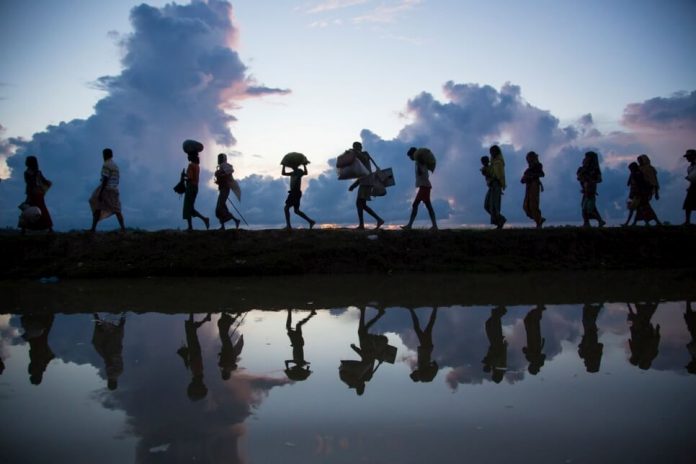This article is authored by Akash Krishnan, a student from ICFAI Law School, Hyderabad. It discusses in detail the rights of migrants and refugees and the role of international bodies in the protection of these rights.
Table of Contents
Introduction
Human rights form the base of human existence thus, are of great importance. After a long period of struggle, they are at this point well-established under the Universal Declaration of Human Rights and the multiple human rights conventions. These documents provide civil, political, economic, social, and cultural rights to every individual either a refugee, migrant, or full-fledged citizen.
Due to the recent outbreak of the COVID -19 pandemic, many people have been forced to leave their houses due to the non-availability of shelter, jobs, food, etc. The COVID -19 being a pandemic has not been included as a reason to displace people internally. This pandemic has forced majorly the migrant workers to leave their workplace and made it difficult for them to return to their natives.
This tough situation requires immediate actions by the national government to ensure that migrants and refugees are taken care of by making arrangements of shelter camps, food, testing facilities and ensuring social distancing while arranging all those.
Who are migrants and refugees
Millions of people leave their homes all around the world in search of a better future for their families. Some are migrants. Some are refugees.
Someone who has been forced to flee his home to escape violence, prosecution and conflicts are called a refugee. They have a right to be protected by the country. They can’t be sent back home because their life or freedom would be at risk. Asylum seekers are the ones who want international protection from the danger in their own country. However, it is pertinent to note that every individual who seeks asylum in a foreign country is not granted the status of a refugee.
On the other hand, a migrant is someone who chooses to move by himself and many of them move back to their home after a few years. Some of them move to find better opportunities and some of them move for education. These individuals are not forced to relocate from their country and leave their homes. These individuals willingly leave their country and are granted permission to live in another country. Their reasons can be economic growth or better education.
Rights of refugees and migrants under International Law
The provisions enumerated under the Universal Declaration of Human Rights apply to every living being from the day of his birth to death. The people among the territory of various nations especially the refugees and migrants are protected under these articles and various other Conventions. Some of the important rights available to the Refugees and Migrants are given below-
Right to freedom from torture or inhumane treatment
Article 5 of the Universal Declaration of Human Rights states that ‘No one shall be subjected to torture or cruel, inhuman or degrading treatment or punishment.’ This implies that to achieve the purposes of the Convention, the refugees and migrants must be protected from inhumane treatment.
Right to freedom of opinion and expression
Article 2 of the Universal Declaration of Human Rights states that everyone has the right to freedom of opinion and expression and no distinction be made based on race, colour, sex, national or social region, birth, place. It is pertinent to note that this right disallows any form of discrimination based on the political, jurisdictional, or international status of the country or territory to which a person belongs.
Right to freedom of thought, conscience and religion
Article 18 of the Universal Declaration of Human Rights states that everyone has the right to freedom of thought, conscience, and religion which includes changing his/her religion or belief, manifesting his/her religion in teaching, worship, etc. No person, even if he or she is a migrant or has refugee status, is forced to change his religion.
Freedom from discrimination
Article 7 of the Universal Declaration of Human Rights states that ‘All are equal before the law and are entitled without any discrimination to equal protection of the law.’ This means that everyone is equal in the eyes of law and all persons should not be treated without any discrimination. Here, the discrimination in the case of refugees and migrants does not include those opportunities which are available only to the citizens but discrimination in matters of basic necessities like food, safety, right against exploitation, and shelter.
Right to asylum
Article 14 of the Universal Declaration of Human Rights states that every person has the right to seek and to enjoy in other countries asylum from persecution. It is further stated that this right may not be invoked in the case of prosecutions genuinely arising from non-political crimes.
Right to family
Article 16 of the Universal Declaration of Human Rights states that the family is the natural and fundamental group unit of society and is entitled to protection by society and the State. It is further provided that every person has the right to marry and start a family.
Article 23 provides that everyone who works has the right to just and favourable remuneration ensuring for himself and his family an existence worthy of human dignity, and supplemented, if necessary, by other means of social protection.
Non-Refoulement
Article 33(1) of the Convention relating to Status of Refugees 1951, non-refoulement refers to the obligation of States, not to refoule, or return, a refugee to the territories where his life or freedom would be threatened on account of his race, religion, nationality, membership of a particular social group or political opinion. This principle is universally acknowledged as a human right. It is expressly stated in human rights treaties such as Article 22(8) of the American Convention on Human Rights, 1969 and Article 3 of the Convention against Torture, 1987.
Rights and obligations of countries regarding detentions
The refugees and migrants have certain rights under International Law. It is the duty of every state to protect and enforce these rights. The State has an obligation to oversee whether the rights provided to all the people within their territory and under their jurisdiction are being exercised or are just for the namesake. Some specific rights are also offered to both migrants and refugees during the detention and are mentioned by the International Organisation for Migration (IOM).
According to the International Migration Law Unit, the obligations of the states are discussed below-
Right to be informed upon entry in the territory and while in detention
The asylum seekers or immigrants must be informed, in the language he/she understands, the reason behind the refusal to enter the border or for their removal from the territory. The state authorities are under the obligation to disclose the grounds of detention.
Right to communicate with the outside world
The persons detained should be given access to communicate with the outside world through electronic mail, fax, and telephone. It is the obligation of the state to provide the lawyer or any representative and relatives both in the country of destination and country of origin.
Obligation to establish a maximum period of detention in national legislation
The maximum period of detention must be established by the law to avoid any kind of harassment and exploitation. After the expiry of the detention period, the detained person must be released automatically and the State must provide for periodic reviews of detention.
Right to humane detention conditions and obligation to respect the inherent dignity of every human person
As stated by Article 10 of the International Covenant on Civil and Political Rights, 1976, all persons must be treated with respect and the dignity of the individual must be valued. It is the obligation of the State, not to treat a person inhumanly and to take positive measures. In case, the State fails to take any such measure then, the State will be held responsible for the violation of Article 7 of the International Covenant on Civil and Political Rights which prohibits torture and cruel, inhumane, and degrading treatments.
Obligation to allow monitoring of reception centre
The State must establish a monitoring system to overlook all detention facilities. The media should be granted access to such centres to ensure transparency and accountability, without encroaching on detainees’ right to privacy.
Prohibition to detain vulnerable individuals
The decision of detaining an individual or extending the period of detention of the person depends on characteristics and circumstances like physical and mental health, history of torture, age, family, pregnancy, etc. The vulnerable individuals which include the victims of trafficking, torture, sexual violence should not be detained. Under any circumstances, if such people are detained then proper care must be taken with health care and skilled professional support.
Agencies monitoring refugee and migrant unrests
A surfeit of agencies works toward ensuring that the right to seek asylum and refuge, of those who face persecution, holds good and monitors immigrant and refugee movements to guard those who seek to enforce those rights.
The U.N. High Commission for Refugees (UNHCR)
The UNHCR is an organ of the U.N. Organization, established in 1950, which works for the protection of refugees, forcibly displaced communities and assists in their repatriation. The UNHCR won two Nobel Prizes for its work in 1954 and 1981.it was founded as a subsidiary of the General Assembly and had primarily replaced the International Refugee Organization since it fell out of favour, post World War II.
The U.N. Relief and Works Agency for Palestine Refugees in the Near East (UNRWA)
The UNRWA acts as a subsidiary to the United Nations that exclusively works for the welfare and voluntary repatriation of Palestinian refugees, to mitigate the disastrous aftereffects of the Palestinian war of 1948.
The U.N. International Organization for Migration (UNIOM)
The UN IOM, set up in 1951, is an organization that works towards the humane and just treatment of migrants. With a roster of 173 members of governmental, inter-governmental, and non-governmental bodies, the organisation aims at attaining well facilitated and developmental migration, ultimately ensuring Freedom of Movement for the displaced.
Organisation for Economic Co-operation and Development (OECD)
OECD is a global economic organisation with an intergovernmental framework spanning 37 member nations. Founded in 1948, initially as the Organization for European Economic Co-operation, OECD works for many objectives such as emigrational economics, integration of politics and economies, monitoring of emigrational factions, etc.
Human Rights Watch (HRW)
Human Rights Watch is a non-governmental organisation that advocates for research and the protection of Human Rights. The organisation is mainly known for pressuring governmental and non-governmental bodies to relent on using abusive and inhumane behaviour concerning immigrants or refugees. HRW won a Nobel Peace Prize in 1997, as a founding member of the International Campaign to Ban Landmines.
Amnesty International (AI)
Amnesty International or A.I. is a non-governmental organisation, headquartered in the UK. AI works to enforce the rights in the U.N. Declaration of Human Rights, comprising eight million members worldwide. It aims at promoting tranquillity concerning the procurement of Human Rights and works towards disarmament of abusive campaigns preaching hostility against refugee groups.
Response to COVID-19
UN Agencies and NGOs have led from the front and laid down guidelines and measures that need to be followed for the protection of these people. The UN Human Rights Officials have mandated that emergency responses to the coronavirus must be proportionate, necessary and non‑discriminatory. Keeping in mind the needs of the people in the wake of the pandemic, the UNHCR has warned the states against any actions which deny these people an opportunity to seek international protection.
International humanitarian law (IHL) is the key legal framework that provides crucial safeguards to people affected by armed conflicts. It protects persons who are not participating in the hostilities and restricts the means and methods of welfare. Populations in armed conflict, weakened by years of fighting, destruction, erosion of basic services, and displacement, are particularly vulnerable to the spread of COVID 19 within the current pandemic. Many of them rely on humanitarian relief for their survival. IHL protects those people and it believes that these protections offer crucial safeguards that must continue to be respected during these testing times.
Frequent outbreaks of COVID-19 have affected migrants, asylum seekers and refugees who are subjected to harsh living conditions and have restricted access to basic services as well as health care. Under IHL, displaced civilians are entitled to shelter, hygiene, health, safety and nutrition. People facing outbreaks of COVID 19 may aim to move to safety, leading to rising local populations and/or authorities to react forcefully to contain them, including by turning the refugee/migrant camps into isolated detention centres. IHL protects all civilians against the consequence of armed hostilities and arbitrary deprivation of liberty and advocates for their access to health care without discrimination.
Conclusion
This challenging and unprecedented time requires swift and immediate actions to be taken to redress the problems faced by migrants and refugees. While a lot has been done to raise awareness, we have no cause for complacency. Most displacement which had occurred in the last few decades could have been prevented in the first place if the parties respected the international humanitarian laws. Those obliged to flee would suffer less if the parties respected the displaced as civilians of their own rather than treating them as outsiders. Sadly, not much has improved in this area. Humanitarian action can bring some relief but it is up to the state parties to conflicts to respect and protect civilians.
References
- http://www.worldlii.org/int/journals/ISILYBIHRL/2001/7.html#:~:text=Freedoms,administration%20regarding%20these%20basic%20freedoms.
- https://blog.ipleaders.in/international-refugee-law-human-rights-study-status-refugees-northeast-india/
- https://www.unhcr.org/3ae6bd900.pdf
- https://www.unhcr.org/publications/brochures/3b779dfe2/protecting-refugees-questions-answers.html
LawSikho has created a telegram group for exchanging legal knowledge, referrals, and various opportunities. You can click on this link and join: https://t.me/joinchat/L9vr7LmS9pJjYTQ9
Follow us on Instagram and subscribe to our YouTube channel for more amazing legal content.
 Serato DJ Crack 2025Serato DJ PRO Crack
Serato DJ Crack 2025Serato DJ PRO Crack











 Allow notifications
Allow notifications


